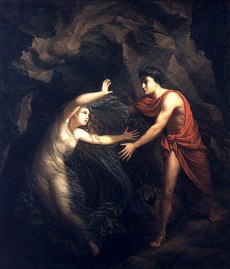Logic — at its most basic, the rule that a statement and its negation cannot both be true at the same time — is a feature of our language, an unavoidable consequence of the fact that we like to name things, invent categories to represent our experience, then use those categories to talk with each other and ourselves.
Outside of language (say, in a world of direct experience, unmediated by concepts of any kind), logic is meaningless. Negation is not a feature of reality per se. That which is “not” can never be perceived; “not” is just a word that helps us communicate more easily by directing our attention.
Whenever people argue about whether a given statement is true or false, the first step in resolving the argument is to clarify exactly what the statement means. Once the debaters clearly agree on the meaning of the question, the debate often disappears. If it doesn’t, then new facts may be brought forward, or gathered where evidence for a contention is lacking…
Because our languages change so quickly, and because each individual mind approaches each word with a different set of associations, our entire body of written and spoken knowledge is continually being re-invented and re-imagined every time the words are read, heard, or spoken anew. Likewise if we wish to hold on to the wisdom of our ancestors, we must regularly retell it in terms that are meaningful to modern, local minds.
When looking for meaning in the symbols provided by myths, fairy tales and wisdom texts, one may use the same approach that one takes to learn the meaning of any word when no dictionary is at hand… look at every instance of use and seek a common thread. This may be called the “All Stories Are True”* approach… we assume that every storytelling conveys important truth, even and especially when stories contradict! If one experiment tells us that light behaves as a wave, and another tells us that light behaves as a particle, we consider (after ruling out experimental error) that our understanding of waves and particles may be incomplete. And so rather than hold to one version of a story and throw stones at proponents of another, we dig deeper, past the surface meanings, until we find a harmonious interpretation and our web of concepts, and our universe itself, grows.
“In formal logic, a contradiction is the signal of a defeat; but in the evolution of real knowledge it marks the first step in progress towards a victory.”
— Alfred North Whitehead
More to come on that particular topic, probably with respect to Kali vs. Raktabija.
* Thanks to Neil Gaiman (via, if I recall correctly, Rick Green’s amazing Prisoners of Gravity) for first introducing me to this phrase.
♥

